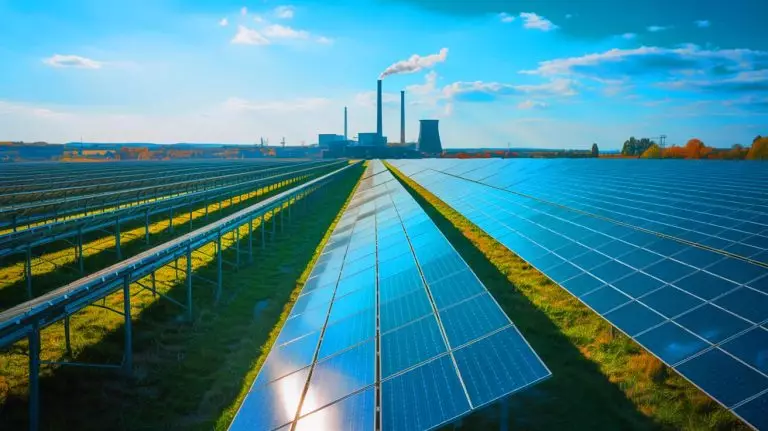| IN A NUTSHELL |
|
The transition towards clean energy is gaining momentum across Europe, as evidenced by a significant milestone in 2024. For the first time, nearly half of the European Union’s electricity came from renewable sources. Even more impressively, solar energy production has surpassed coal, marking a historic achievement for the continent. This shift is reflective of Europe’s concerted efforts to embrace sustainable energy practices and reduce reliance on fossil fuels, paving the way for a cleaner and more sustainable future.
Solar Energy: A Rising Power in the EU
In 2024, the European Union witnessed a groundbreaking development in its energy sector. For the first time ever, the contribution of solar power to the EU’s electricity supply exceeded that of coal. According to climate think-tank Ember, solar energy accounted for 11% of the EU’s energy supply, while coal lagged slightly behind at 10%. This achievement is a testament to the rapid expansion of solar power across the region, with solar production rising by 22% compared to 2023.
The addition of 66 gigawatts of solar capacity in 2024, equivalent to more than 450,000 solar panels being installed daily, underscores the EU’s commitment to renewable energy. Every EU member state experienced growth in solar capacity and production, highlighting the widespread adoption of solar technology. This shift not only underscores the potential of solar energy to meet energy demands but also reinforces the EU’s position as a leader in the global transition to renewable energy.
The Decline of Coal and Fossil Fuels
The decline of coal as a primary energy source in the EU marks a significant step towards reducing greenhouse gas emissions. As solar power rises, the reliance on coal has diminished, aligning with the EU’s goals to phase out fossil fuels and transition to cleaner alternatives. Despite this progress, fossil gas remains a significant part of the energy mix, accounting for 16% of the EU’s electricity generation. However, its usage has decreased for the fifth consecutive year, indicating a gradual shift away from fossil-based energy.
The continuous decline in the use of fossil gas reflects the EU’s dedication to sustainable energy practices. As renewable energy sources like solar and wind gain traction, the dependency on traditional fossil fuels is likely to decrease further. This transition is crucial for achieving climate goals and creating a sustainable energy future, ensuring energy security while reducing environmental impact.
Renewable Energy: Dominating the Energy Mix
Renewable energy sources have become a dominant force in the EU’s energy landscape, with renewables accounting for 47% of the total electricity production in 2024. This significant share underscores the ongoing shift towards a more sustainable and environmentally friendly energy system. As the EU continues to invest in and expand its renewable infrastructure, the reliance on fossil fuels is expected to diminish further.
This transformation not only contributes to climate change mitigation efforts but also enhances energy security by reducing dependence on imported fuels. The EU’s success in integrating renewables into its energy mix serves as a model for other regions aiming to achieve similar sustainability goals. The record increase in solar capacity and production demonstrates the feasibility and benefits of large-scale renewable energy adoption.
The Economic Impact: Negative Electricity Prices
The shift towards renewable energy has also had notable economic implications. In Germany, electricity prices turned negative, reflecting the oversupply of renewable electricity at certain times. This phenomenon occurs when electricity generation exceeds demand, leading to negative pricing. It highlights the importance of developing advanced energy storage solutions and smart grid technologies to manage surplus energy efficiently.
Negative electricity prices also emphasize the potential for cost savings associated with renewable energy. As the EU continues to harness the power of renewables, consumers may benefit from reduced energy costs, further promoting the adoption of clean energy technologies. This economic aspect complements the environmental benefits of renewable energy, creating a compelling case for continued investment and development in the sector.
As the European Union continues to make strides in renewable energy, the transition towards a sustainable future becomes increasingly tangible. The surpassing of coal by solar power is a landmark achievement that signals a brighter, cleaner future for the continent. However, as this transformation unfolds, questions arise about the future of energy in the EU. What innovations and strategies will the EU employ to ensure a complete transition to renewable energy, and how will these changes influence global energy trends?
Did you like it? 4.6/5 (23)







Wow, this is an amazing milestone for the EU! 🌞 Can’t wait to see what comes next for renewable energy.
Does this mean my electricity bill will go down? Asking for a friend! 😂
How reliable is solar energy compared to coal during winter months?
Thank you for sharing this incredible news. It’s heartening to see real progress in the fight against climate change.
Solar power might be clean, but what about the environmental impact of manufacturing solar panels?
Finally! Coal has had its day. Let’s keep the momentum going! 🚀
How does the EU plan to handle energy storage issues with such a high reliance on renewables?
Solar energy is great, but shouldn’t we also focus on reducing energy consumption overall?
Is this trend likely to continue in the coming years or could it reverse?
Hooray for the sun, but let’s not forget about investing in wind energy too! 🌬️
This is a step in the right direction, but fossil gas is still a concern. What’s the plan there?
Negative electricity prices sound good, but does it mean companies are losing money?
Could this shift to solar energy inspire other continents to follow suit?
Isn’t it risky to rely heavily on solar energy given the unpredictable weather conditions?
Fantastic news! Time to say goodbye to coal for good. 👋
What are the economic implications for countries that have traditionally depended on coal?
This is great for the EU, but what about countries outside the union?
How will this shift impact jobs in the coal industry? Are there plans for retraining workers?
Can solar energy alone meet the EU’s growing energy demands in the future?
This is a historic milestone indeed. Cheers to a brighter, greener future! 🌍
How do solar panels perform in countries with less sunlight, like those in Northern Europe?
With this shift to solar, what’s the next big innovation in renewable energy?
Awesome news! But let’s not get complacent; there’s still much work to be done.
What role does government policy play in this shift toward solar energy?
Are there any challenges in integrating solar power into the existing grid infrastructure?
Finally, some good news in the energy sector! Let’s hope it sparks global change. ✨
Will the transition to renewable energy make electricity more expensive in the long run?
Interesting milestone, but how sustainable is the production and disposal of solar panels?
I’m curious about the impact of this shift on energy security in the EU.
Great news for the environment! But how will this affect electricity prices in the short term?
Hopefully, this is just the beginning of a global energy revolution! 🔋
What are the technical challenges facing this transition, and how are they being addressed?
All countries in the EU (and around the world) felt the impact of the fossil fuel gas price increases after Putin invaded Ukraine and therefore panicked and wanted to become more energy independence hence invested in clean energy rather than an EU policy as surgegest in the artical. The EU could have done this 10 years ago.